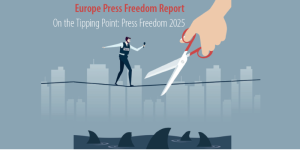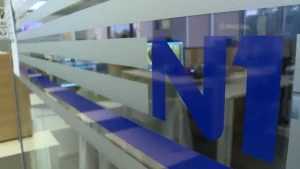With an absolute amnesty for crimes against citizens and journalists, Serbia experienced a complete collapse of the rule of law and the end of the legal system. A country where not a single murder of a journalist has been solved or punished, where killers still walk free, today records the worst year in terms of journalist safety
Since the beginning of 2025, the number of attacks, pressures and threats is increasing month by month, and the most vulnerable are reporters who report from student and civil protest throughout Serbia. The ominous genesis is further fueled by the fact that last year the police obstructed investigations into attacks on journalists – in half of the cases registered in the database of the Supreme Public Prosecutor’s Office, the police did not respond to the prosecution’s request, nor did they go to the field to collect the statements and evidence needed to move the proceedings from a deadlock.
The same police “practice” continued this year, but with one huge difference: the police now not only do not react when they witness attacks on journalists, but often act on the instructions of the perpetrators themselves. The highlight is that police officers physically attack journalists on duty. Associations of journalists have recorded dozens of such cases in the past few months, and in August alone, as many as 14 police attacks on journalists while reporting on protests.
These are just some of the facts and conclusions presented by the interlocutors of Veran Matić, president of ANEM – Maja Sever, president of the European Federation of Journalists, Tamara Radovanović, journalist of Južne Vesti, and Mladen Savatović, reporter of N1 – in the last episode of the web series “The Big Picture”.
Watch the full episode of “The Bigger Picture”
Speaking about the consequences of endangering the safety of journalists for the freedom of the media, Matić emphasized that even in the judiciary there is no progress in prosecuting attacks on journalists – both last year and this year, only one case was legally concluded, in contrast to the three-digit number of attacks.
“Even if there is a verdict, the president will grant amnesty,” Matić pointed out, adding that the decision of the Court of Appeal acquitting the accused for the murder of Slavko Ćuruvija – after two first-instance verdicts of 100 years in prison each – looked more like a pardon than a verdict.
For journalists on the ground, the impunity of attacks goes hand in hand with the repression to which they are constantly exposed.
Tamara Radovanović described the attack she experienced on May 17 in Nis, when, in parallel with the student rally, SNS organized a meeting of the Movement for the People and the State. The unknown man tried to knock the phone out of her hand and told police: “Get her out of the way, she’s going to cause trouble.” Instead of protecting her, the police took her away. Radovanović points out that even today he does not feel safe on the field.
Mladen Savatović recalled the case when he filmed the migration of voters from Smederevo to Belgrade during the elections. Although he was attacked by a person identified as an SNS official in Smederevo, she did not suffer any consequences. Only after a year and a half, the prosecutor’s office decided not to open the case, with the bizarre explanation that “there is no basis”, because the N1 program was broadcast, and therefore there was no interference with the work of journalists.
Speaking about the dangerous spiral of pressure, Matić reminded that the targeting of journalists starts with politicians, continues through tabloids, is then massively spread by bots on the networks, and then returns to the tabloids again – in a vicious circle. He highlighted the attacks on Radar Vuk Cvijić and the continuous targeting, threats and pressure on the KRIK newsroom as particularly worrying.
During all that time, the European Commission emphasized the selection of members of the REM Council as the main priority in communication with the media community in Serbia, although it is clear to everyone that in these conditions, independent functioning of that body cannot be expected.
Maja Sever, president of EFJ, emphasized that the organization regularly reacts and prepares reports on the situation with journalists in Serbia. Referring to the joint mission of several European organizations in Belgrade, she pointed out that because of their conclusions they were even accused of being “against Serbia’s path to the EU”. She added that she understands the frustration of journalists in Serbia, because the EU almost never adequately responds to their appeals regarding attacks and pressures.
Source: Vreme




